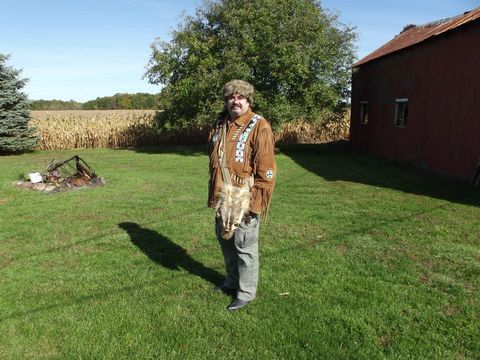Admin

|
Will Our Pets Be In Eternity With Us?
Posted : 1 Jul, 2014 11:23 PM
Scripture tells us when Y'shua returns he will be riding a white horse (Revelation 19:11)....And look at what Isaiah says!
Isaiah 11: 6 The wolf will live with the lamb; the leopard lie down with the kid; calf, young lion and fattened lamb together, with a little child to lead them. 7 Cow and bear will feed together, their young will lie down together, and the lion will eat straw like the ox. 8 An infant will play on a cobra's hole, a toddler put his hand in a viper's nest. 9 They will not hurt or destroy anywhere on my holy mountain, for the earth will be as full of the knowledge of ADONAI as water covering the sea.
Do animals have a spirit?
When reading the Bible, it is often important to remember that we are not reading the text in its original language. It is also important to realize that God preserved and protected scripture in both its English copies, and also in the original language. No other document of ancient history survives in as many intact or partial manuscripts than do those of the Bible. It is clear that God's will has been to preserve it in supernatural excellence of both condition and numbers of manuscripts. (Mc Dowell, Evidence That Demands a Verdict).
The preservation of the Bible in its original language, together with the fact that the Bible is readily available to anyone in various English translations, gives us a wonderful opportunity for a full and rich understanding of its contents. We can read passages with ease, in our native language. We can use concordances, lexicons, and other aids, to study the original texts, so that we have an even more detailed understanding of Biblical teachings.
A quick look at a concordance and lexicon will show that the translators of the Bible had conflicts to resolve. Preservation of the truth contained in the text was important, but so was the "flow" of the text as understandable in English. Translation may require an entire phrase in a second language, in order to convey accurately, all that is stated and implied by one word in the original language. On this basis, I would like to focus on one Hebrew/Aramaic word, in order to address the question of animal spirits.
The English word, "spirit", is used 217 times in the New American Standard Version of the Old Testament. Using my Holman's New American Standard Exhaustive Concordance of the Bible with Hebrew-Aramaic and Greek Dictionaries, I find that in 213 cases, the original Heb/Aram word behind the English word "spirit", is the Heb/Aram word "ruach". That is to say, that in only 4 uses of the English word, "spirit", was there a word in the original text that was NOT "ruach". This word, "ruach", also occurs in other places in the Old Testament. For whatever reason, in those passages, the translators felt it best to use another English word, other than "spirit". Here are the other words they chose:
air (used 2 times), anger (1 time), blast (2), breath (31), breathless (1), cool (1), courage (1), despondancy (1), exposed (1), grief (1), heart (1), inspired (1), mind (3), motives (1), points (1), quick-tempered (1), side (4), sides (2), strength (1), temper (2), thoughts (1), trustworthy (1), wind (96), winds (8), windy (2), wrath (1).
Now, to get a sense of the usual uses of the word "ruach", here are some selected (few) passages containing the word. In each verse, you'll find one or more words in ALL CAPS, which indicates the English word that has been translated from the word "ruach". Obviously, I cannot type out all 213 occurances, so these are my own selections.
Genesis 1:2 "And the earth was formless and void, and darkness was over the surface of the deep; and the SPIRIT (ruach) of God was moving over the surface of the waters."
Genesis 7:20-22 The water prevailed fifteen cubits higher, and the mountains were covered. And all flesh that moved on the earth perished, birds and cattle and beasts and every swarming thing that swarms upon the earth, and all mankind; all that was on the dry land, all in whose nostrils was the breath (neshamah) of the SPIRIT (ruach) of life (chayyim), died.
2 Kings 2:15 Now when the sons of the prophets who were at Jericho opposite him saw him, they said, "The SPIRIT (ruach) of Elijah rests on Elisha." And they came to meet him and bowed themselves to the ground before him. Psalm 31:5 Into Thy hand I commit my SPIRIT (ruach); Thou hast ransomed me, O Lord, God of truth.
Psalm 51:10-11 Create in me a clean heart, O God, And renew a steadfast SPIRIT (ruach) within me. Do not cast me away from Thy presence, And do not take Thy Holy SPIRIT (ruach) from me.
(The word "ruach" is also used to denote "evil spirits"...) Job 4:15 "Then a SPIRIT (ruach) passed by my face; The hair of my flesh bristled up.
There is nothing in the original Hebrew/Aramaic text to seperate the use of the word "ruach" in Genesis 1 and Genesis 7, from its uses in the rest of the Old Testament, except for the fact that those first two verses apply to animals. I believe the word probably means "spirit" in all of its uses.
Now, let me take you to Numbers 22 for a brief comment. In this passage, Balaam's donkey sees an angel, and Balaam does not. There is no mention in this passage of God "opening the eyes of the donkey to see the angel". There IS mention that Balaam did not see the angel until God opened his eyes. Why? Are animals, different in spirit, and aware of such, when humans are not? I speculate that this may be so. Further, notice that when God "opens the mouth of the donkey", the donkey does NOT speak God's words. Instead, the donkey complains of the treatment Balaam has given it, saying, in essence, that it has always been an obedient donkey in the past, and does not deserve such treatment. Is it possible that the donkey has enough of a sense of self, to feel wronged? Is the donkey self-aware enough to know that its behavior has always been obedient, and therefore, good? Again, it is my speculation that this may be so.
I further have read much information about Koko the gorilla. She speaks in sign language, and has an extensive vocabulary. Koko has invented words for objects that she did not know the sign for, evidence that she is actually using language, not just mimicry or conditioned response. For example, Koko once called a "ring", a "finger-bracelet", because she had never seen a ring before. Similarly, a stale biscuit was signed "cookie-rock"!
Koko has much meaningful dialog with researchers, about "good" and "bad", and obviously interprets this in light of obedience of her human keepers. She also has an awareness of the finality of death, as evidenced by conversations with her about her pet kitten, when it died. (Yes, Koko, an animal, kept a PET!)
Coupled with some other minor passages in the Bible, research in the field of "animal awareness", and my own observations, I have concluded that animals have a spirit, but that it is an ANIMAL spirit - different from our own. However, please remember that these are my SPECULATIONS AND PERSONAL CONCLUSIONS, and that while I may share them with you, I wish no arguing or ill will to result from discussion of them.
Do Animals Have Souls?
Above, we looked at the occurance of the Hebrew/Aramaic word "ruach", predominantly translated "spirit". Now, let's look at the English word "soul".
The English word, "soul", is used 244 times in the New American Standard Version of the Old Testament. Using my Holman's New American Standard Exhaustive Concordance of the Bible with Hebrew-Aramaic and Greek Dictionaries, I find that in 240 cases, the original Heb/Aram word behind the English word "soul", is the Heb/Aram word "nephesh". That is to say, that in only 4 uses of the English word, "soul", was there a word in the original text that was NOT "nephesh".
This word, "nephesh", also occurs in other places in the Old Testament. For whatever reason, in those passages, the translators felt it best to use another English word, other than "soul". Here are the other words they chose:
any (1 time), any-one (3), appetite (7), being (2), beings (3), body (1), breath (1), corpse (2), creature (6), creatures (3), dead (3), deadly (1), death (1), defenseless (1), desire (12), desire (2), discontented (1), endure (1), feelings (1), fierce (2), greedy (1), heart (5), heart's (2), herself (12), himself (23), human (1), hunger (1), life (148), lifeblood (2), lives (34), living creature (1), longing (1), man (4), man's (1), men (2), mind (2), myself (2), ourselves (3), own (1), passion (1), people (3), perfume (1), person (90), slave (1), some (1), some (1), strength (1), themselves (6), thirst (1), throat (2), will (1), wish (2), yourself (24)
Now, to get a sense of the usual uses of the word "nephesh", here are some selected passages containing the word. Again, I cannot use over 200 passages here, so these are my own choices.
Genesis 1:30 ...and to every beast of the earth and to every bird of the sky and to every thing that moves on the earth which has LIFE (nephesh in combination with chayyah - note the fact that there are two words here being ignored by translators... hmmm...), I have given every green plant for food."
Genesis 9:3-4 Every moving thing that is alive shall be food for you; I give all to you, as I gave the green plant. Only you shall not eat flesh with its LIFE (nephesh), that is, its blood.
Genesis 1:20-24 Then God said, "Let the waters teem with swarms of living CREATURES (nephesh), and let the birds fly above the earth in the open expanse of the heavens. And God created the great sea monsters, and every living CREATURE (nephesh) that moves, with which the waters swarmed after their kind, and every winged bird after its kind, and God saw that it was good. And God blessed them, saying, "Be fruitful and multiply, and fill the waters in the seas, and let birds multiply on the earth. And there was evening and there was morning, a fifth day. Then God said, "Let the earth bring forth living CREATURES (nephesh) after their kind; cattle and creeping things and beasts of the earth after their kind"; and it was so.
Genesis 9:9-10, 12, 15-16 Now behold, I Myself do establish My Covenant with you, and with your descendants after you; and with every living CREATURE (nephesh) that is with you, the birds, the cattle, and every beast of the earth with you; of all that comes out of the ark, even every beast of the earth. (12) And God said, "This is the sign of the Covenant which I am making between Me and you and every living CREATURE (nephesh) that is with you, for all successive generations... (15-16) ...and I will remember My Covenant, which is between Me and you and every living CREATURE (nephesh) of all flesh that is on the earth.
Genesis 35:16 & 18 Then they journeyed from Bethel; and when there was still some distance to go to Ephrath, Rachael began to give birth and she suffered severe labor. (18) And it came about as her SOUL (nephesh) was departing (for she died) that she named him "Ben-oni"; but his father called him "Benjamin". 1 Samuel 18:1 Now it came about when he had finished speaking to Saul, that the SOUL (nephesh) of Jonathan was knit to the SOUL (nephesh) of David, and Jonathan loved him as himself.
Psalm 6:4 Return, O Lord, rescue my SOUL (nephesh); save me because of Thy loving kindness.
Psalm 23:3 He restores my SOUL (nephesh); He guides me in the paths of righteousness For His name's sake.
The word "nephesh", translated "soul" 240 times, is applied to animals many times. The case for animal souls seems stronger to me than that for the issue of animal spirits. The translators have chosen to use other words for "nephesh" in every case where animals are indicated. I now challenge you to go back and read all the verses again, saying "SOUL" where the translators have used another word for "nephesh"... works, doesn't it?
At the time of translation of the Bible into English, the doctrine of animals NOT being in heaven was already taught by some churches. Perhaps the translators wanted to avoid controversy, which could have caused their work to be rejected by large portions of mainstream Christianity.
Perhaps, playing devil's advocate for a moment, they had some examples of Hebrew, in which it was clear that there were two meanings for the word "nephesh"... I doubt this, knowing that Hebrew was a dead language for several centuries, but it is arguable.
When I studied what is said about "spirit" and what is said about "soul" in the Bible, it became obvious to me that the emotions are tied to the "soul" and the intellect, will, and decision making to the "spirit". My personal observations of animals make it easy for me to believe animals have souls. Each of you will have to reach your own conclusions, however.
How Noah changed our relationship with animals.
The Bible presents us with a series of Covenants, or contracts, if you would, between God and man. These contracts are set in the sweep of the history of Israel and her peoples, ending with the covenant of Christ and the successful spread of Christ's salvation, from the Jewish nation, to all the world.
To discuss a plan this grand would take volumes of books. So, I will only look at specific examples where animals are mentioned. This means I will be glossing over many important points about these covenants, and I wanted to remind you all of this.
The first covenant is found in Genesis 1:26-30. We find that dominion is given for man to rule over the animal kingdom. God creates man in His image, and there are several mainstream interpretations of this fact. In verse 28, man's responsibilities are outlined... in any covenant, there is God's part, and man's part. God gives us the gift of dominion, which sets us apart from the animals, and we, in return, take on some responsibilities to be fruitful, multiply, fill and subdue the earth, and rule over the animals...not a bad deal!
In the next part of the contract, God says (verse 29), "Behold, I have given you every plant yielding seed that is on the surface of all the earth, and every tree which has fruit yielding seed; it shall be food for you..." Note that meat-eating is not given. Stop for a minute, and think about why it is not mentioned.
It is my belief that in the garden of Eden, before the fall of man, there was no death. That means no meat-eating. It means no carnivores. It means no carrion beetles, no flies feeding on spoiled flesh, no mold or bacteria to break down dead organic material. No disease. The entire environment would be different... no death... stop for a minute or two and think about that.
Now, I believe some of us have a memory left in us - a distant one of Eden, in our souls, if you will. A longing to return. I believe this memory is in the Animal Rights Activist who refuses to eat or wear animal products. Who refuses to accept the fact that even when well cared-for, animals do die. Are they correct? No. We live in THIS world, not Eden. We have the promise of heaven, even heaven on earth, in which all of this is set straight again. Without this promise, the ARA tries to set it straight through humanistic effort. They deserve our compassion, our prayers, and our witness, while we fight them to prevent them from achieving their goal of eliminating the human-animal bond. They feel something is amiss, and they are right, but their solution is without God, and against God.
Moving on...
In Genesis 1:30, plants are given to the animals as food. Note that when the plants are given to the animals or to man, for food, there is no corresponding responsibility... they are just given as a gift. The end result of the covenant is that while animals are tied in to man's covenant in some pretty specific ways, they are not given any responsibilities or rights, just the gifts. Meanwhile, man bears some responsibilities for both.
We move on then, to Genesis 2:16 and 17. Without quibbling over various interpretations of these verses, please do note that when God gave man food, he also made some rules about that gift. There are no rules given to the animals, only to man. Move on to verses 18 - 20. God sets out to find a helper for Adam, and creates the animals, but none are suitable as a mate. The original language actually says none of them "corresponded" to Adam. The animals are considered as possible "helpers". This means they have that capacity - to be helpers and companions - otherwise, why consider them?
No let's go on to Genesis 3:14. We probably all remember the part the Serpent played in Adam's demise... and we all remember that the Serpent is cursed. However, how many of you missed this phrase? "Cursed are you (Serpent) MORE THAN ALL THE CATTLE, AND MORE THAN EVERY BEAST OF THE FIELD..."
Why are the animals cursed? Because in the first covenant, man is in charge of them, has dominion over them, is responsible for them... and somehow, this ties them into the curse of the serpent? Is it because a snake allowed himself to be used to tempt Eve? I will not argue either of these points, but speculate on them, and wish to point out that for whatever reason, God curses the animals along with the Serpent, Adam, and Eve.
When Adam disobeyed, the whole environment changed. Death entered in, affecting not only mankind, but all the animals as well. Adam is thrown out of Eden, where lions grazed, where mosquitos drank plant sap (as the males of the species still do), and where nothing decayed. In verse 18, you see that even the plants are affected. With death as a possible result of being eaten, plants now grow protections. Death is now a fact of life. The animals did not sin, but their fate is our fate.
Now, for comic relief, imagine this: Adam leaves Eden and gets his first COLD. What a bummer! :)
Now, we move on to the next covenant. In Genesis 6:5-8, we see that the fall of man has brought man to new depths. God is sorrowful about the creation of mankind. Does he decide to send a plague to wipe evil mankind from the earth? No. He decides to "...blot out man whom I have created from the face of the land, from man TO ANIMALS TO CREEPING THINGS, AND TO BIRDS OF THE SKY; for I am sorry that I have made them. But Noah found favor in the eyes of the Lord."
This idea is repeated in verses 17 - 19.
Probably, all of you know the basic story of Noah and the Ark. Note that in Genesis 7: 2 - 4, God not only orders "two of every kind", but also orders "seven of every clean animal". Why?
Now look at Genesis 8: 17, 10-22. Noah's first act, upon setting foot on dry land, is to sacrifice one of every clean animal. Perhaps it was not Noah's behavior that set him apart from the other people who were condemned to the flood... perhaps it was the fact that he was "righteous by the blood" of sacrificed animals. Noah is certainly not portrayed as sinless, yet he pleased God. Hmmm....?
Now, in Genesis 9: 1 - 5, God makes His covenant with Noah. In verse 1, He reminds Noah of elements of the covenant with Adam. This new covenant does not replace the old, but augments it. Then, in verse 2, He does something that may seem strange. "And the fear of you and the terror of you shall be on every beast of the earth and on every bird of the sky; with everything that creeps on the ground, and all the fish of the sea, into your hand they are given." You see, up to now, animals were NOT wild. They were unafraid of man. This is the reverse of what we were taught - that wild animals were tamed and domesticated... but it seems that first, it was the other way. This is the second reason the Animal Rights Activist is wrong... they want to revert all animals to the wild state - a step in the wrong direction!
In verse 3, God institutes meat-eating. Now, here is the reason the animals needed to fear man... and also the reason there were SEVEN of the clean animals. Man will now eat the clean animals, and sacrifice them to God, and more were needed, so that they could survive and reproduce.
Verses 5 - 6 establish that those who commit murder are required to die, and this goes for animals that kill man, also.
Now, after the Covenant has been defined, God states WITH WHOM the covenant is made... ( vs 9 & 10) "Now behold, I Myself do establish My covenant with you, and with your descendants after you; and with every living creature that is with you, the birds, the cattle, and every beast of the earth with you; of all that comes out of the ark, even every beast of the earth."
Again, the fate of the animals is one and the same as the fate of mankind.
The principle of God, saving a remnant, found in the promise of the rainbow, will be repeated time and time again in the Bible, from now on. Here, we will stop. The important fact that carries into part 4, is that through Adam, all were subject to death, even the animals. (2 Cor. 5: 14 - 15) Through Noah, the animals were saved along side the humans. In each covenant, the animals are carried along with what has happened to man. Our fate determines theirs.
Faith
Now we come to the final step in our search for an answer to the question, "Do animals go to heaven?"
We have looked at the meaning of the Hebrew words in the Old Testament, regarding the word "nephesh" which is most often translated as "soul", and have discovered that the same word is used for both animals and humans, with no distinction. My personal conclusion is that animals do have a soul, and that this is supported Biblically.
We have also examined the meaning of the Hebrew words in the Old Testament, regarding the word "ruach" which is most frequently translated as "spirit". Here, we find the connection is very weak, with the word "ruach" used only once in application to a non-human animal. This leaves us with three possible interpretations. We may conclude that animals do not have a spirit, and the use of the word "ruach" in that one instance, has some other meaning or implication. We may also conclude that animals do not have the same kind of spirit as a human, and the word "ruach" would not properly describe an animal spirit. Finally, we may believe that even one use of the word "ruach" in connection with animals, must be seen as evidence that animals do have a spirit. The choice between these opinions will remain a personal one.
Biblical references to "salvation", as the means by which beings may enter heaven, also do not refer to the spirit. The phrase that is repeated over and over in the Bible is that of "save (ing) my soul". The Bible also mentions "commending one's spirit" into God's hands.
We also have Romans 8:19ff, which may be interpreted in three ways. In one interpretation, Romans 8:19ff speaks of the redemption of the "creature" as referring to man's physical body, and only the body. This narrower interpretation of the verse does, in my opinion, rob it of much of its richness and meaning. There is evidence elsewhere in Biblical text, to indicate that animals were subjected to the same curse as man, because they were inseparably tied to man's fate. It would seem logical to carry this thought on into the Romans 8 text.
This leaves us with two other interpretations of Romans 8:19ff. In the first, we would assume that the entire ecosystem will be replaced with a new one, containing plants and animals as part of the ecological balance. In this interpretation, resurrection of animals does not take place - the plants and animals in the new earth are also new.
In our final choice, animals were cursed because of man, and are redeemed because of man's acceptance of the gift of salvation provided by Christ's death and resurrection. Where one died for all, one was resurrected for all, and all who accept are resurrected as a result. This interpretation would include the individual resurrections of animals, and would be consistent with the "salvation of souls". Now, which interpretation you choose is, of course, a matter of personal choice and faith. Faith is the evidence of things hoped for, the substance of things not seen. (Hebrews 11:1)
I have chosen to place my faith in the individual resurrection of the souls of animals. I expect to see again, the pets I once loved. In our current covenant and eco-system, animals are killed, and eat one another. I cannot change that, and do not feel obligated to become a vegetarian because of my faith. I have, however, shaped my use of animals and my relationship with them, knowing that whatever I do in regard to my animals will follow me to the judgment seat of God... and it is my wish to be able to leave my life someday with no regrets.
therefinersfire.org
Post Reply
|









